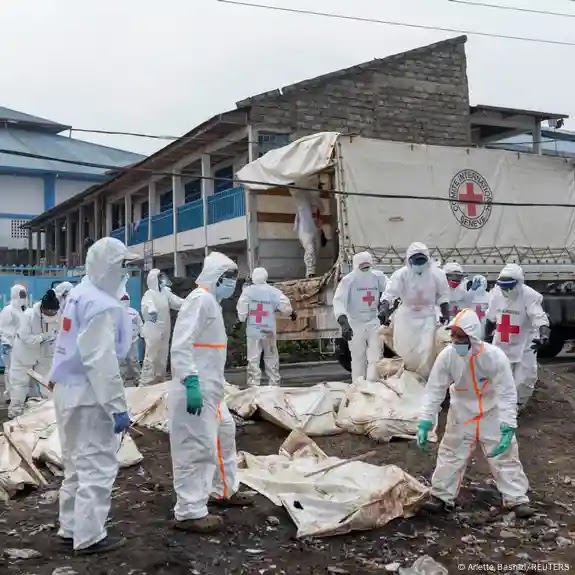ZIMSPHERE
GOMA – The government of the Democratic Republic of Congo (DRC) has rejected a unilateral ceasefire declared by Rwanda-backed M23 rebels as "false communication," even as reports of heavy fighting in eastern Congo persist, according to the United Nations.
 |
| Red Cross personnel handle the bodies of the victims of the fighting between Congo forces and M23 rebels in Goma [Image: AP Photo/Reuters] |
The Congo River Alliance, a coalition of militias that includes M23, announced the ceasefire on Monday, citing "humanitarian reasons." The rebel advance had severely disrupted the flow of aid, food, and essential supplies into Goma, a city of 2 million people. With hospitals overwhelmed and dead bodies left in the streets for days, humanitarian organizations and international actors have intensified calls for safe corridors to deliver aid.
Despite the ceasefire declaration, Congo’s government remains firm in its stance. "All we are waiting for is the withdrawal of the M23," government spokesperson Patrick Muyaya told journalists.
Last week, the M23 seized control of Goma, a critical humanitarian hub and a region rich in mineral resources worth trillions of dollars. The takeover forced 300,000 internally displaced people to flee from camps on the city’s outskirts, exacerbating an already dire crisis.
Meanwhile, the rebels have reportedly gained ground in other areas of eastern Congo, raising concerns over their potential advance toward Bukavu, another provincial capital in South Kivu. However, M23 spokesperson Lawrence Kanyuka dismissed such claims, stating: "It must be made clear that we have no intention of capturing Bukavu or other areas. However, we reiterate our commitment to protecting and defending the civilian population and our positions."
Despite this assurance, U.N. spokesperson Stephane Dujarric confirmed reports of heavy fighting in South Kivu but added that there no reports of the M23 moving closer to Bukavu.
The M23 rebels are believed to be backed by some 4,000 Rwandan troops, according to U.N. experts—far more than in 2012 when the group briefly captured Goma before withdrawing under international pressure. The militia remains the most formidable of over 100 armed groups operating in eastern Congo, a region home to minerals critical for global technology industries.
Congo’s government has signalled openness to dialogue but insists that negotiations must align with previous peace agreements. Rwanda and M23, however, accuse Congo of failing to honor past commitments. Regional leaders are scheduled to meet Friday and Saturday in Tanzania to discuss the escalating conflict.
The humanitarian toll continues to mount. On Tuesday, Congo’s Interior Minister Jacquemain Shabani stated that 2,000 people had died in last week's fighting, alleging that bodies had been buried in mass graves. Shabani described them as "victims of massacres perpetrated by the Rwandan occupation army." Rwanda has yet to respond to the accusation.
The U.N. health agency previously reported that at least 900 people were killed in the clashes between M23 rebels and Congolese forces in Goma. As the violence persists, residents continue to bury their dead, with no immediate solution in sight.
(Associated Press contributed to this report)





















0 Comments